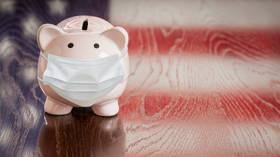Coronavirus forces Americans to do something unheard of: Save money!

The US personal savings rate, which shows how much of people’s income is left after they pay taxes and spend money, reached a historic 33 percent last month, as Covid-19 rattles the economy.
Data published by the US Bureau of Economic Analysis on Friday showed that the savings glut soared around 20 percent in just one month and hit the highest levels since tracking began in the 1960s. The current rate is almost twice as high as it was during the 1973-75 recession, when the previous peak of over 17 percent was recorded.
Also on rt.com US billionaire wealth skyrockets to over $3 TRILLION during pandemicThe boost in savings, while obviously good for individual households, can have ripple effects on the economy as whole. As people hoard cash and spend less, it can be hard to revive economic activity, which has been severely crippled by the pandemic. With people stuck at home due to coronavirus restrictions, consumer spending was down over 13 percent in April.
The unprecedented saving comes despite jobless numbers hitting levels not seen since the Great Depression, as more than 40 million Americans have filed for unemployment benefits over the last 10 weeks. Despite massive layoffs caused by lockdowns and other measures to contain the virus, disposable personal income (funds available for spending or saving) increased 12.9 percent, according to the Bureau of Economic Analysis.
Also on rt.com US weekly jobless claims climb by 2.4 million despite easing of lockdown measuresThe devastating impact of Covid-19 on the economy was already seen in the first quarter data released earlier this week. The US suffered the worst quarter since the 2008 financial crisis, as GDP decreased five percent in the first three months of the year.
“The decline in first quarter GDP reflected the response to the spread of COVID-19,” the bureau said on Thursday, adding that the full impact of the pandemic cannot be estimated by the first quarter results.
For more stories on economy & finance visit RT's business section













